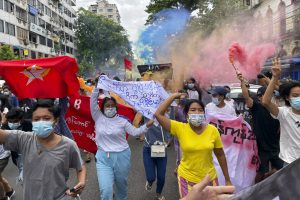Sanctions are a critical and effective tool for governments and international bodies such as the United Nations or the European Union to express anger at actions that threaten them or cross a line of behavior that is anathema to their system of values. Critics say sanctions are often poorly conceived and rarely successful in changing conduct; supporters contend they have become more effective in recent years and remain an essential foreign policy tool. I completely agree with the supporters.
Since the 9/11 terrorist attacks, there has been a pronounced shift toward targeted or so-called smart sanctions, which aim to minimize collateral damage to innocent civilians. Sanctions are a way of coercing better behavior but take time to bite.
One widely claimed success story of economic sanctions dates back to those the U.N. imposed on South Africa’s apartheid regime in 1977, with a mandatory arms embargo. The regime ended in 1994. Many advocates considered sanctions crucial to the defeat of apartheid.
History has shown that Western sanctions imposed on Myanmar from 1998 to 2015 yielded results. They imposed significant pressure on the military regime then in power to negotiate with the National League for Democracy and held elections in 2015. This led to a slight relaxation in military rule and opened our country economically.
Following the coup in Myanmar on February 1, Western countries – namely, the United States, EU, United Kingdom, Canada, and New Zealand – imposed sanctions on the military’s State Administration Council (SAC) at a much faster pace, and the U.K. and EU just added more sanctions. What took years in the past took only months following the coup. On July 2, the U.S. announced its latest round of sanctions, designating 22 individuals connected to the regime including three SAC members, four military-appointed cabinet members, and 15 adult children or spouses of previously designated Burmese military officials whose financial networks have contributed to military officials’ looting of the country’s assets. In addition, the U.S. Department of Commerce added Wanbao Mining, Ltd., two of its subsidiaries, and King Royal Technologies to its Entity List.
Most governments and international agencies have condemned the coup and the junta has found it difficult to garner international support. It has lost its seat in the U.N. and not been recognized by international bodies such as the World Health Organization and International Labor Organization.
The democratically elected officials, who won office at the November 2020 elections, have formed the National Unity Government (NUG). Massive protests have rocked Myanmar as the people reject the coup and a broad swath of the country’s civil society participates in our freedom movement. To date, more than 900 people, including children, have sacrificed their lives fighting the military regime and thousands more have been arrested with torture and beatings a certainty. The military is repeating the atrocities committed in the past on its own innocent and unarmed population, including the Rohingyas.
After a year of COVID-19 shutdowns, Myanmar’s economy was already suffering. The planned vaccination program was halted by the SAC. The current third surge of COVID-19 is taking a toll without effective measures and supplies for the treatment of patients. The coup has amplified those problems to an alarming level. Trade with neighboring countries has been disastrously disrupted. Cutting off the internet, restricting access to bank accounts, and seizing bank funds, among other oppressive measures, have led to the near-collapse of the financial sector. Hyperinflation has forced a 30 percent devaluation of the currency in just four months. Some economists estimate that Myanmar’s economy – essentially in a free fall – could suffer a contraction of 30-40 percent this year. Foreign investment has nearly dried up as investors flee the country.
The people of Myanmar yearn for freedom. What can the world do to support my country’s democracy movement?
First, it is crucial that countries impose targeted economic sanctions on Myanmar and take effective steps to enforce those measures.
Second, the SAC needs to be prevented from using the international banking sector and obtaining finance from international institutions such as the World Bank and the International Monetary Fund.
Third, sanctions have to be escalated urgently to capture key revenue sources including oil and gas remittances to the Myanma Oil and Gas Enterprise (MOGE), Myanmar Mining Enterprise 1 and 2, and the junta’s timber exports. Western governments should also drop the hammer on the junta’s “crony” tycoons. Cronies help the military evade sanctions and pump billions of dollars into their coffers.
We are now in the sixth month of Myanmar’s Spring Revolution. Each day my country’s people are sacrificing their lives in the fight for their right to freedom and democracy – the ability to choose who they decide should make their laws, guarantee respect for human rights, and build a federal union of Myanmar with participation from all of our many ethnic groups. We can and will fight our own battles until we succeed. I do not believe it is asking too much of the international community to support our efforts by cutting off access to the funds that the evil, murderous military regime uses to prop itself up.

































